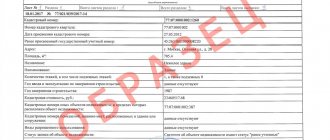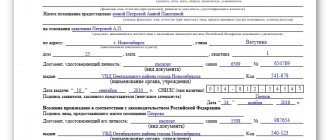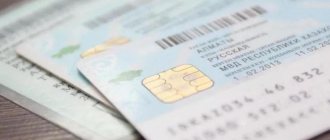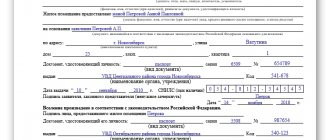Pravozhil.com > Registration and registration > Fictitious registration at the place of residence in legislation and judicial practice
Registration or registration in places of residence (stay) is mandatory for everyone. However, sometimes it is fictitious and illegal. For such registration you can suffer serious punishment.
We will talk further about what fictitious registration at the place of residence is and what the judicial practice is on this issue.
Fictitious registration at the place of residence, judicial practice, what the law says
Fictitious registration liability and judicial practice
What is fictitious registration? All persons legally present in the country must register at their place of permanent residence or temporary residence.
This obligation is established by the Law entitled “On the right of citizens of the Russian Federation to freedom of movement, choice of place of stay and residence in the Russian Federation” dated June 25, 1993 No. 5241-1.
Despite the informative nature of this institution, serious penalties are provided for its violations.
They are now fighting especially hard against “rubber apartments”, in which a large number of residents are fictitiously registered. The same document also contains the concept of fictitious registration.
It may be recognized as such if the following circumstances exist:
- When providing false information and (or) documents for registration.
- If there is no intention to stay (reside) in the premises specified during registration.
- If the tenant (owner) of the apartment did not give his consent to the registration of another person in it.
Case Study
I was contacted by a principal who had been caught with a similar registration by a local police officer and took an explanation from him, in which he explained that he had registered the person formally without granting the right of residence. As a result, the investigator’s decision to initiate a criminal case under Art. 322.2 of the Criminal Code of the Russian Federation, nerves and insomnia of the principal.
Fortunately, they had not yet had time to interrogate him as part of a criminal case and everything was fixable. As a result, a correctly constructed position on the case is a decision to terminate the criminal case due to the lack of corpus delicti.
I hasten to note that even if the case is under Art. 322.2 of the Criminal Code of the Russian Federation has been sent to court, this is fixable, it can be terminated according to the note to this article due to active repentance, punishment in this case can be avoided. The most important thing is don’t sit still, take action!
Note to Art. 322.2 of the Criminal Code of the Russian Federation. A person who has committed a crime under this article is exempt from criminal liability if he contributed to the disclosure of this crime and if his actions do not contain another crime.
How to declare registration illegal?
How to check the authenticity of registration?
If violations are detected during registration, grounds arise for declaring it illegal.
However, the procedure for recognizing the fictitiousness and illegality of registration can only be carried out in court.
If the legal owner (tenant) of the property has found extra tenants in the housing and communal services receipt, then he needs to understand this situation.
Most often, they have to file applications to evict illegally registered residents and deregister them. Neighbors, local police officers and registration authorities can also identify cases of fictitious registration.
To submit such an application, you need to collect evidence that your existing registration is fictitious. Next, you need to fill out the application correctly and submit the corresponding demand to the judicial authority.
Tenants (owners) of apartments, their neighbors, local police officers or employees of the authorities registering residence can submit such an application.
If, upon examination, the fact that the registration is fictitious is confirmed, the violator will be deregistered on the basis of an act issued by the court. In practice, courts consider quite a lot of such cases. Most often, demands are made to remove fictitious residents from the register.
Registration concept
Registration indicates in which residential premises a particular citizen permanently resides. He can act as the owner of the property, a tenant on the basis of a lease or social tenancy, and is also allowed to use the premises on other legal grounds.
It is allowed to register in different residential premises, which include:
- apartments;
- separate rooms;
- private houses;
- office premises;
- rooms in nursing homes or other similar institutions.
Permanent registration has no time limits and can be issued literally within one day. It is in its presence that Russian citizens can use various government services. It is allowed to additionally issue temporary registration, but information about permanent registration is not removed from the passport.
How to check for authenticity?
Due to the increased responsibility for fictitious registration, many people have questions about how to recognize it. If possible, you can examine the tenant's documents. A specific note is made in the passport regarding permanent registration. The temporary one is certified by a special leaflet.
If it is not possible to view the documents, then you should submit a corresponding request to the authorities carrying out such registration. In this case, it is better to come in person, since such information may not be provided by phone or email.
In addition, information about registration can also be obtained indirectly from the company that manages the house, from an extract from the entrepreneur, or other documents that indicate the residence address of persons.
It is important to remember that various companies offering to obtain information of interest for a fee may deceive you. Often such measures are a cover for fraud. Information from the Internet should not be trusted either.
Other penalties
As for the punishment for lack of registration or delay in registration , then for this the guilty person will be brought to administrative responsibility and is obliged to pay a fine of two to three thousand rubles . There is no provision for criminal prosecution for such a violation.
Attention
In the central and northern capital, for failure to register, a violator faces a fine of five to seven thousand rubles.
Is it possible to live outside of your place of registration?
Can it be considered legal to live outside your place of registration?
Quite often it happens that people do not live in the place of their registration. They are temporarily moving and are in no hurry to leave their old home. Some people simply do not attach importance to this issue.
At the same time, they believe that since there is official registration in another place, there is no violation.
However, according to the law, you need to not only have a residence permit somewhere, but specifically in your place of residence or temporary location.
And when you change it, you need to register at the new place. If this does not happen, then statutory liability may apply.
Many hope to avoid it, because not everyone is checked for registration. But if a lack of accounting is discovered, the violator may face fines, forced labor, and even imprisonment. In the best case, he will simply be deregistered, and in the worst case, he will be given a fine or other criminal punishment.
Conclusions and discussions
Once again, I want to remind you that language is your enemy! Never say that you registered a person formally. In extreme cases, say that you were registered for the purpose of residence, a place was provided, the person spent one night, and then moved out for objective reasons. And the best thing is, in any situations that you do not understand, when communicating with law enforcement agencies, do not rush to give evidence, but use Art. 51 of the Constitution of the Russian Federation and do not testify against yourself (at least until you talk to a lawyer and he will formulate the correct position on the case for you).
Opinion of human rights activists on liability for fictitious registration
It should be noted that there is no consensus on this issue. Many human rights activists doubted its effectiveness even at the development stage of this project. They believe that increasing fines cannot solve the problem. After all, not all cases of “rubber registration” are detected.
In addition, some generally consider it necessary to abandon punishment for its absence. Indeed, unlike a pre-existing registration, registration is, by law, only a notification.
And citizens are free to choose where they are and live. Exceptions include cases of providing false documents and information.
However, in reality it turns out that they are not much different. Some human rights activists see this as a contradiction to the basic law of the country.
Others believe that such measures will help reduce the number of people who provide fictitious registration for money.
They also believe that this law will help better regulate the flow of illegal emigration. After all, the problem of “rubber housing” is mainly associated with the arrival and accommodation of foreign workers.
Despite the notification nature of the registration that exists today, violations in this area should not be allowed.
Its absence or fictitiousness leads to very unfavorable consequences, both for those who carried out such registration, and for the residents and owners (tenants) of housing themselves.
Illegal occupants may be evicted, fined, or even sentenced to imprisonment. The rest suffer the same punishment, with the exception of deregistration.
You can learn about some issues of liability for fictitious registration by watching the video:
See also Phone numbers for consultation Dec 14, 2021 kasjanenko 605
Share this post
Discussion: 5 comments
- Lera says:
12/18/2017 at 00:32It’s a stupid and useless law; it would be better if real criminals were caught and imprisoned, rather than looking for crimes where in fact there are none. Many people, thanks to registration, get the opportunity to work, but at the same time rent housing from some other person.
Answer
- Larisa says:
12/19/2017 at 00:43
One of our neighbors was fined, a calm and peaceful person, he came to another city to earn some money, this registration was required for work, the authorities demanded it, he did it and got a problem.
Answer
- Lisa says:
12/23/2017 at 00:38
The very bad thing is that some kind of temporary registration can lead to such problems, including imprisonment, or the loss of a large amount of money. I think the laws need to be revised, people are trying to earn money to live on, which is already scarce, and then there are these laws.
Answer
- Nikolay says:
08/08/2019 at 11:39
I also disagree with this law. But, probably, it is needed so that the fight against terrorism can be carried out more successfully. Although, it is doubtful that visiting radicals go to officially register. Quite the contrary.
Answer
- Arkady M. says:
08/31/2019 at 17:05
Well, maybe one day they will cancel passports, and then registration will not be needed. But today there are some standards for those same migrant workers who enter the country to work. Ideally, it would be nice for the state to create hotels for them in every city where they could temporarily register.
Answer
Responsibility
For a long time, filing a fake registration was only fraught with administrative liability. But since 2013, with the advent of Articles 322.2 and 322.3 of the Criminal Code of the Russian Federation, the situation has changed dramatically. False registration began to be considered a crime for which the person who issued it would bear criminal liability.
According to the newly introduced articles, a citizen (of Russian and other citizenship) for registering a false registration may suffer the following penalties:
- Fine up to five hundred thousand rubles;
Read more about fines for lack of registration here.
- Forced labor for up to three years;
- Prohibition on holding certain positions;
- Imprisonment for up to three years;
When determining the penalty, neither the type of fake registration (permanent or temporary) nor citizenship (Russian or foreign) plays a role. It is important to note that when a crime is discovered, both the person who issued the fake registration and the owner of the living space on which it was issued are held accountable.
Info
The owner of the apartment in which the offender is registered can avoid punishment and not be held accountable if it is revealed that he contributed to the detection of the crime. For example, if the registrant applied for registration without the consent of the owner using false documents.
Object of crime
The norm by which fictitious registration is punished is located in the chapter on encroachments on management procedures. Accordingly, the object of the act is the legal activity of employees who ensure timely registration of persons at their place of residence in accordance with the requirements of the law, as well as deregistration. The placement of an article in the chapter on encroachments on management procedures indicates that punishment can be imposed not only directly on officials of authorized bodies, but also on other entities carrying out fictitious registration.
Form 6
It acts as one of the key documents for obtaining permanent registration. You can fill out the form on the State Services portal or at the MFC. In the first case, it will be issued electronically, in the second - by hand on paper. Filling out the document must be taken very seriously, since there should be no errors or omissions in it. Otherwise, the form will have to be rewritten. Form 6 is submitted by the owner of the premises personally. Neither relatives nor friends can do this. A power of attorney executed in accordance with all the rules will not help either. The exception is minors. They are filled out and submitted by legal representatives (guardians, parents, etc.).
Primary requirements
The sample application for registration at the place of residence should be filled out with a blue/black pen. Words must be legible. It is advisable to write in block letters. Attached to the form:
- A valid passport with copies of all pages with stamps on them. If a minor is registered, a birth certificate is provided.
- Title document for the premises.
- Owner's consent. It must contain information about the subject receiving registration, as well as about the owner of the object (if these are different people). In addition, the consent contains information about the premises and a note on deregistration at the previous place of residence (if necessary).
Currently, there are special consultations at passport offices. There, any person can be provided with assistance in preparing the document.
Common Mistakes
The main reason for returning an application is illegible handwriting. A significant error is considered to be incorrect spelling of proper names, geographical objects or names of government agencies. It is advisable to copy such information from your passport. Particular attention should be paid to the date format. They are presented differently in different lines. Many applicants forget about the abbreviation “Mr. R." when indicating the date of birth. All words written on the form must be consistent in cases, numbers, and genders. After filling out, you should check what you wrote again.
Specific situations
As mentioned above, filling out and submitting the form is carried out exclusively by the registering entity. The situation is more complicated if a citizen registers in premises that do not belong to him. In this case, the owner of the property must sign the form. The presence of the owner of the premises at the FMS is not necessary, since registration requires his written consent, certified by a notary. If it is available, the absence of the owner is not a reason for refusal to register.
Nuances for foreigners
If a foreigner comes to Russia for temporary residence, he must register with the migration service within 7 days. If this is not done, he will be deported from the country, and a ban on entry into Russia is often applied altogether.
Fictitious registration of foreign citizens is a serious crime. The places of residence of foreigners are often subject to inspections by migration officials. If there is evidence that the migrant does not actually live at the registration address, then such registration is considered illegal.
Foreigners can register with the owners of the premises, in a hotel or sanatorium. After completing this process, they are issued a special temporary registration certificate.
Fictitious registration of citizens of the Russian Federation, as well as foreigners, may involve providing false data or using premises in which the migrant or Russian citizen will not actually live.











